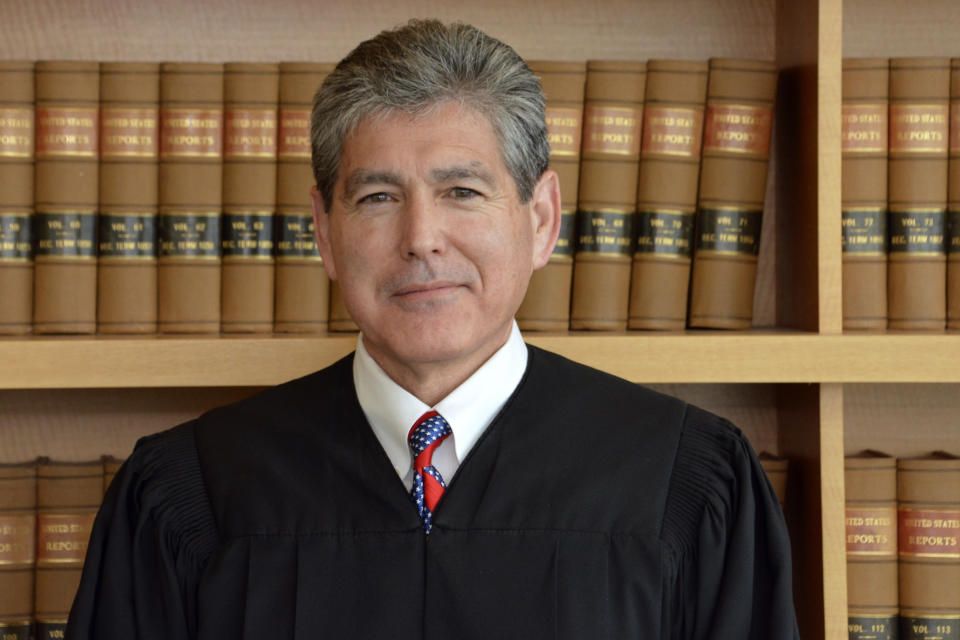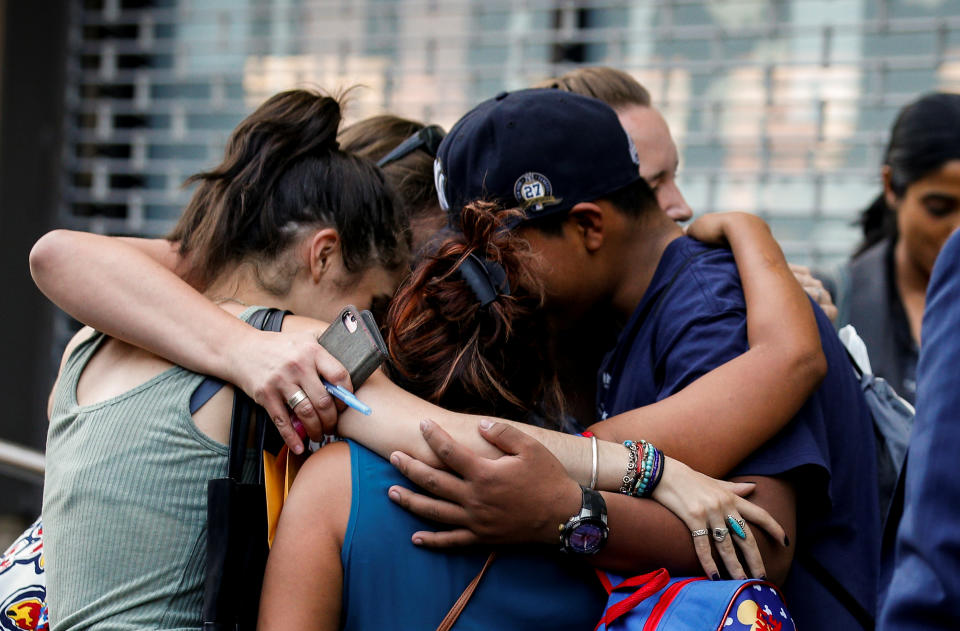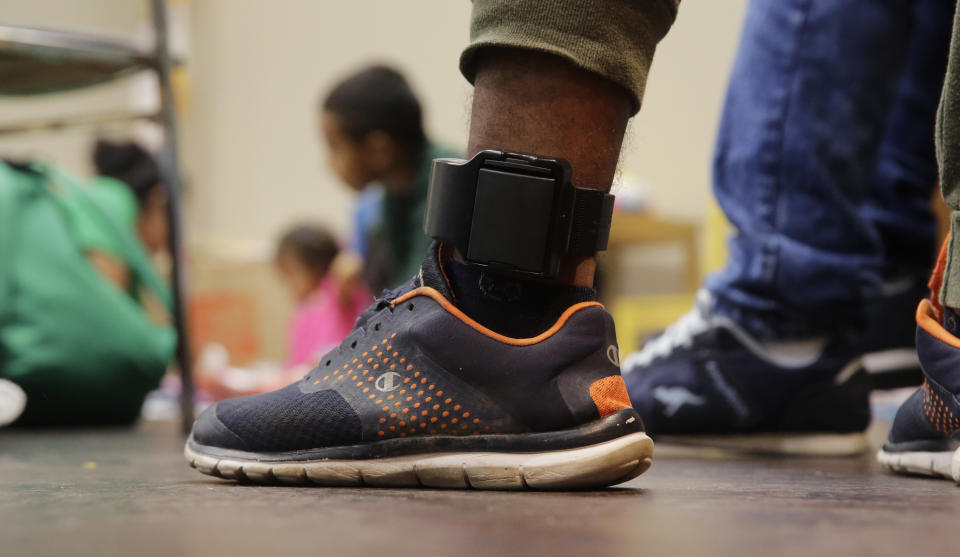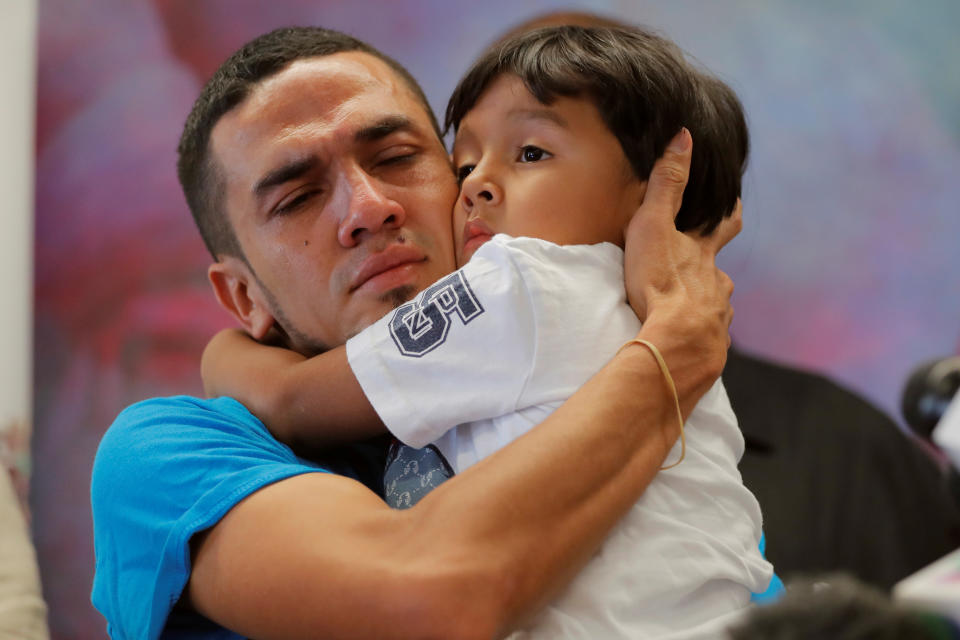Judge demands more information from U.S. on family reunifications as deadline approaches

The federal judge hearing a challenge to the administration’s policy separating immigrant families at the border told U.S. lawyers Tuesday that they must provide more information about the process of reunifying parents and children.
“This should really be a transparent process,” U.S. District Court Judge Dana Sabraw said during a status hearing ahead of Thursday’s deadline for the reunifications, ordering the government to provide the American Civil Liberties Union, which brought the class-action suit on behalf of the parents last month, with additional information on parents who the government says may not be eligible to get their children back. That includes upwards of 400 who may have already been deported.
“Some of this information is unpleasant, it’s the reality of the case,” said Sabraw, of the Southern District of California. In June, Sabraw issued a nationwide injunction, temporarily halting the separation of families at the border. He set a July 10 deadline to return all “tender age” children under the age of 5, which the government missed, and made this Thursday the deadline for older children.
“It’s the reality of a policy that was in place that resulted in large numbers of families being separated without forethought as to reunification and keeping track of people,” he said. “And that’s the fallout we’re seeing.”

Sabraw commended the government’s efforts to reunite parents with older children, saying it was a “remarkable achievement” that all 1,637 parents whom the government has deemed eligible for reunification appeared on track to have their children returned to them by Thursday.
But Sabraw noted that there are still hundreds of cases in limbo among the 2,551 children of parents potentially covered by the ACLU suit who have been held by the government. He cited the “deeply troubling reality” that according to the government’s own figures, as many as 463 parents may have either already been deported without their child or for some other reason can’t be located. He ordered the government to provide that information to the plaintiffs.
“For those parents who were removed without children, the sooner the plaintiffs have that information, [the sooner] they can locate them,” Sabraw said. He gave the government’s attorneys until Wednesday at noon to provide the ACLU with lists — even if incomplete — of parents who’ve already been deported, those who waived their right to reunification prior to removal, and those who’ve been released from ICE custody.

In a court filing Monday, lawyers for the ACLU noted the government’s failure to provide this previously requested information, emphasizing the need for “a complete list of the parents with final removal orders who signed a form electing to be removed without their children.” The ACLU is concerned that parents might not have understood their rights. Earlier this month, it asked ICE to stop presenting detained parents with a form that, the organization said, “misleadingly suggests parents must waive their right to contest removal if they want to get their child back.”
“These parents urgently need consultations with lawyers, so that they do not mistakenly strand their children in the United States,” they wrote in Monday’s filing.
Michelle Lapointe, acting deputy legal director of the Southern Poverty Law Center Immigrant Justice Project, echoed the ACLU’s concern “that people weren’t fully informed about their rights before they were made to sign paperwork from the government.”
The SPLC has been providing varying degrees of legal services to more than 40 fathers who’d been held in ICE detention in Georgia after being separated from their children, mostly older than 5. Of that group, she said, about 19 have been reunited with their children and released into the interior of the country over the past week. The rest, she said, have been moved from Georgia without prior notice from ICE. Lapointe said they are believed to be in Texas, but the organization has limited information and communication with them.

Related Slideshow: Violence, poverty and politics: Why Hondurans are escaping to the U.S. >>>
Lapointe said she does not yet know whether any of those fathers waived reunification. ICE has claimed that the waiver form was not being given to parents who arrived seeking asylum, but the SPLC told Yahoo News it knew of at least four cases where it was.
Agreeing to accept deportation without one’s child is “an incredibly momentous decision for any parent to make, and we just want to make sure it was made knowingly and it was an informed choice,” Lapointe said.
During Tuesday’s status hearing, government attorney Sarah Fabian stated that ICE had identified at least 85 individuals with a final order of removal who waived reunification by signing this form, though she expected to be able to provide a more complete number by Wednesday. According to the court filing submitted by the government on Monday, 900 parents covered under the class action suit have final orders of removal.
“The Trump administration’s lack of transparency is now bordering on stonewalling,” Lee Gelernt, deputy director of the ACLU’s Immigrants’ Rights Project, said in a statement following the hearing Tuesday. Gelernt disputed the success of the reunification effort, saying the government set a low bar for itself by counting only those parents and children whose identities and locations are known.
“No one should forget that the government’s claim that it will meet the reunification deadline is based on its exclusion of parents it has deported or can’t locate, as well as on its unilateral, unchecked decision of who is eligible to be reunited or not,” he said.

The government’s rationale for labeling families ineligible for reunification has come under scrutiny by immigration attorneys and advocates. Diane Eikenberry, associate director of policy at the National Immigration Justice Center, said that two weeks after the government missed its court-ordered deadline to reunify the 102 children under age 5 who’d been separated from their parents at the border, “NIJC continues to advocate for two child clients under the age of 5 who the government has deemed non-eligible for reunification.”
“In both cases,” Eikenberry said, “the government still has yet to provide the families or NIJC any evidence or documentation justifying their determination that the families should not be reunified.”
The SPLC’s Lapointe expressed similar concerns about the “wide range of reasons” the government has been using for not reunifying certain parents with their children.
“I’m very concerned that some of these parents are not being given due process to show that they’re fit and have a right to be with their kids,” she said, arguing that “We need a process to test these assertions that the government is making about fitness, we can’t just take their word for it.”

“Certainly,” she acknowledged, “there are cases where a parent is not fit, but I don’t think that is the majority of those parents. And in any case, they should be given a process to challenge government’s accusations.”
So far, Lapointe said, none of the men the SPLC has spoken to have been deemed ineligible for reunification, but it’s something they’re keeping a close eye on.
“The federal government has shown that they did not have a plan to reunite these children with their parents and only did so because the federal court forced them to,” she said, suggesting that “the idea that they would be excluding parents from the class for reasons that are not proper is not far-fetched.”
In Monday afternoon’s court filing, the government listed 917 adults who’d either been deemed ineligible “or not yet known to be eligible.” Sixty-four, it said, had a “prohibitive criminal record” or were otherwise deemed ineligible for reunification. In that same filing, the government stated that 130 parents had waived reunification prior to removal during interviews with a representative from the U.S. Department of Health and Human Services, which is tasked with housing unaccompanied immigrant children and has been largely leading the reunification effort. By Tuesday’s hearing, that number had dropped to 127.
Asked to explain the change, Fabian told the judge, “my understanding is that some have changed their mind.”
Read more from Yahoo News:
Adam Schiff: Trump the ‘gravest threat to American democracy’ he’s ever seen
Ex-NSA official: Russian hack of Democrats was ‘assembly line operation’
How the Land and Water Conservation Fund became a political football
Heat wave strikes the Arctic, and the climate enters the Twilight Zone
Photos: Deadly wildfires ravage coastal region near Athens, killing dozens



